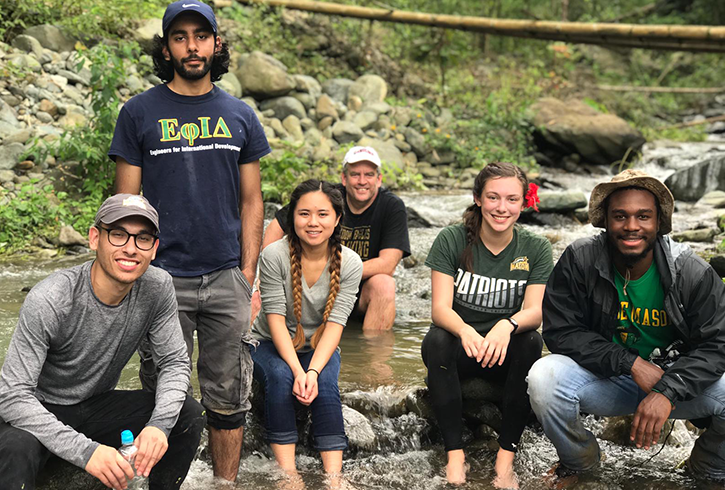
Several members of the Engineers for International Development visited a community in Ecuador for a week to help them develop a clean drinking water system. Pictured here from left to right: Omar Azizi, Mubeen Farukh, Min Lu Kelly-Durham, faculty advisor Matthew Doyle, Sylvia McLain, and Andrew Simpson.
When a group of Mason Engineering students heard there was a community in Ecuador that desperately needed clean drinking water, they jumped at the chance to help.
Several members of Mason’s chapter of Engineers for International Development (EfID) flew to San Pablo de Amali for a week in January to assess the agricultural area’s current water system and find a way to improve it.
They discovered that the drinking water in the agricultural community has high levels of bacteria, and many homes don’t have access to running water. “There is an existing system that functions sporadically, sometimes delivering water but not clean water,” says civil engineering senior Omar Azizi, vice president of the group.
Some of the disinfection processes in the system are defunct because they require a lot of maintenance, says Sylvia McLain, a junior in the Sid and Reva Dewberry Department of Civil, Environmental, and Infrastructure Engineering (CEIE). “They’ve stopped taking care of it, so sediment and bacteria are in the water.”
The students talked with residents about what they need, tested different sources of water including the local rivers, and mapped out the geography of the area. The group must decide whether to improve the current system or build a new central system for about 200 people.
"Our goal is to give them a working water system," says Andrew Simpson, a civil engineering senior and EfID president. "We're going to use our skills and passion to do that."
They’ll work on the designs for the project with guidance from faculty advisor Matthew Doyle, an engineer and adjunct faculty member; David Lattanzi, CEIE assistant professor; and Kenex Sevilla, (BS Civil Engineering ’14, MBA ’18), a quality control manager with Dewberry and former president of Mason’s chapter of EfID.
Since the group’s founding in 2011, it has conducted projects in Nicaragua, Honduras, the Peruvian Andes, and the Amazon, addressing small communities' concerns over water shortages, clean water access, sanitation, and hygiene.
A team of 10 students will travel back to Ecuador this summer to improve or replace the system with the help of the residents and funding from the Civil Engineering Institute Board and EfID fund-raisers.
“When you can meet the people who are impacted by your work, it changes your perspective and makes the work feel more important,” Azizi says.
The experience “humbled me,” McLain says. “These people just want clean water, and it’s so easy for us to take a shower, get a glass of water, and wash our clothes.”
